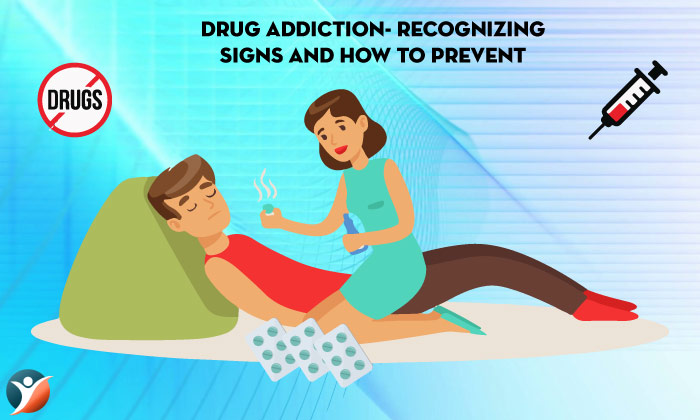
Drug Addiction- Recognizing Signs and How to Prevent

Drug addiction commonly known as substance use disorder is a health condition which affects a person’s brain and behaviour leading to an inability to control the use of the illegal and legal drug. Substances like nicotine, alcohol, and marijuana are also considered as drugs. And when a person is addicted, they may continue using the drug despite the adverse effect on the health.
Generally, the drug addiction starts as an experimental use of a leisure drug in a social situation, but for some, the drug use becomes more frequent. While others, particularly with the opioids, the drug addiction starts with the exposure to the prescribed medication.
While the risk of addiction, and how quickly a person is addicted to a drug varies by drug. Some drugs like opioid painkillers have higher chances and cause of addiction as compared to others.
But, thankfully we have got proper medications and treatments that can help a person to overcome this health condition easily. All they need some patience and support from the loved ones to regain control over their life.
So, before we discuss how to overcome this health condition, let’s know about some of its common symptoms.
Symptoms of drug addiction
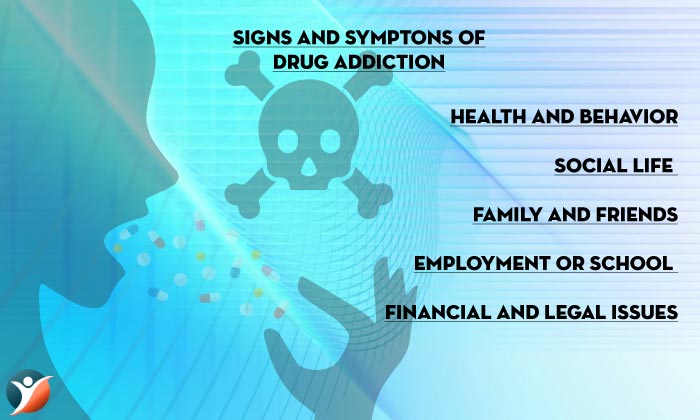
Even though different drugs have different effects, the symptoms of addiction are more or less similar. So, here we have listed some common symptoms of drug addiction and if you notice any of these symptoms and signs then, talk to a trusted person about your drug use.
- Feeling to use the drug on a regular basis- daily or even several times in a day.
- An intense urge for the drug which blocks all other thoughts.
- The need to have more and more drug to maintain the same effect.
- Taking drugs in large amounts over a longer period than you intended.
- Spending money on drugs even though you can’t afford it.
- Unable to meet the regular work responsibilities or avoiding social activities.
- Using drugs even though you know it’s affecting your personal life and causing harm both mentally and physically.
- Performing things that you normally don’t do like stealing.
- Spending a good amount of time in getting drugs, using them and recovering from its effects.
- Performing risky activities like driving when under the influence of the drug.
- Failed attempts to stop using drugs.
- Facing withdrawal symptoms when you stop taking drugs.
Recognizing the signs of drug addiction on the basis of type of drug
1. Marijuana
People generally use this drug by eating, smoking or inhaling a vaporized form of the drug. And these forms of drugs are often used with other substances like alcohol or other illegal drugs.
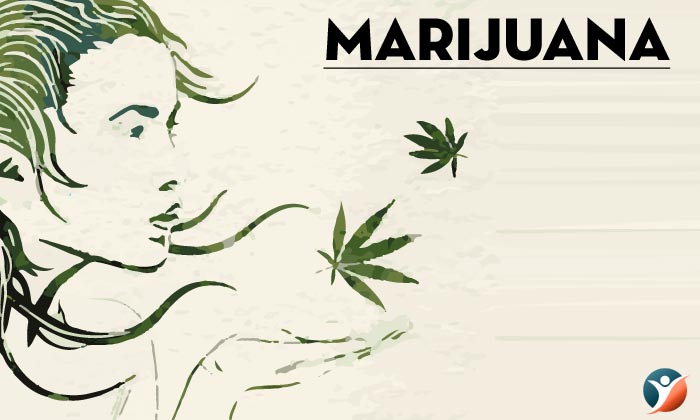
Recognizing a marijuana addiction
One of the biggest signs of marijuana addiction is an insatiable urge to use marijuana no matter how badly it is going to affect one’s life. This could possibly mean spending too much on drugs and getting high at work. While in most of the cases, people don’t feel normal unless they get high on this drug.
Common signs
- Loud talking
- Sudden weight loss or gain
- Glassy or red eyes
- Lack of motivation
- Inappropriate laughter followed by sleepiness
- Paranoid thinking
- Decreased mental sharpness
Prevention
Some people who have used marijuana over a period of time might have faced withdrawal while quitting it because most of the signs are not physical. So, seeking help from support groups or a therapist is necessary.
2. Inhalants (vapours or glue)
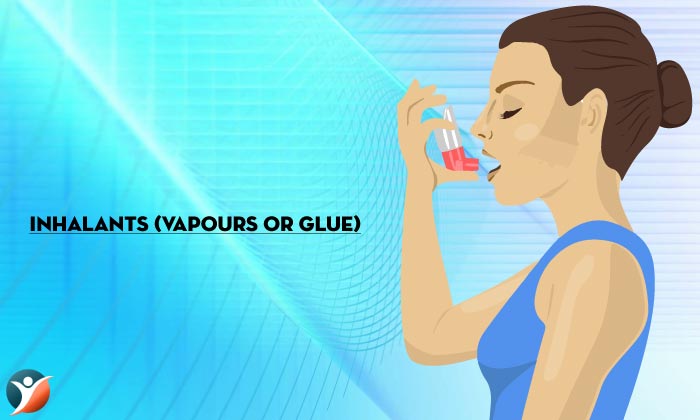
The signs of inhalants may vary depending on the substance. Some of the most common inhaled substances are paint thinners, glue, cleaning fluids etc.
Recognizing an inhalants addiction
Well, it is hard to determine the addiction to inhalants as most people stop abusing the inhalants when they reach a certain age. Still, there a criterion is used to diagnose the addiction to this substance.
It can be identified by having two or more than 11 symptoms of substance disorder as defined by DSM (Diagnostic and Statistical Manual). These criteria are based on the repeated use of the drug despite knowing the negative effects.
Common signs
- A headache and nausea
- Watery eyes
- Rashes around the throat and mouth
- Drowsiness
- Poor control of muscles
- Secretion from nose
Prevention
A person can overcome this addiction by taking a behavioural therapy, 12-step programs, inpatient rehab, and by joining support groups.
3. Stimulants (including cocaine and crystal meth)
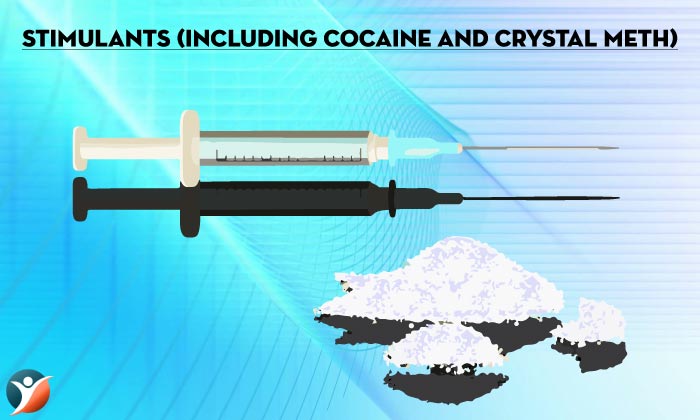
These are the most misused drugs which are commonly used to boost energy and improve performance at work or to lose weight and control appetite.
Recognizing stimulant addiction
The addiction to stimulant is generally developed by a frequent use because of performance or recreational purposes. In most of the cases, the person abusing this drug don’t realize that an addiction is forming.
Some of the most common indications of stimulant addiction are:
- Increasing amount of substance to gain the desired effects
- Facing withdrawal issues while quitting
- Unsuccessful attempts to quit.
Common signs
- Dry mouth and nose
- Hyperactivity
- Excessive talking followed by depression
- Going long periods without eating or sleeping
- Large pupils
- Stroke
- High blood pressure
Prevention
To overcome the addiction to stimulants may require a detox period. So, an inpatient treatment at the rehab centre with therapy and support is needed. Further, people may also seek therapy outside the treatment centre. In short, therapy is the best way to overcome this addiction.
4. Hallucinogens
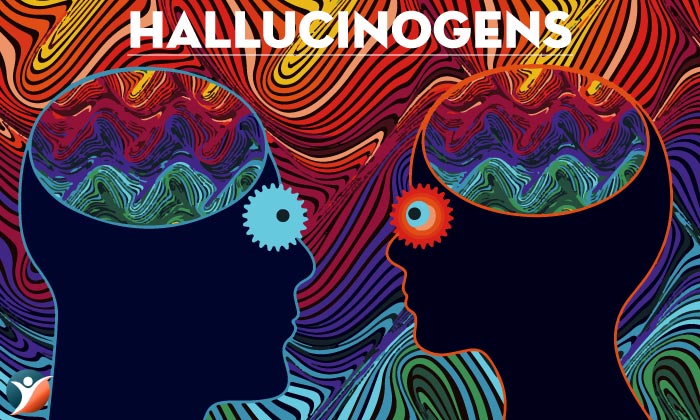
These types of drugs are not physically addictive, but they can be psychologically addictive. These are the two-common type of Hallucinogens namely, Lysergic acid diethylamide (LSD) and phencyclidine (PCP). Other types also include Peyton, ecstasy, ketamine, and mescaline.
Recognizing addiction to hallucinogens
It is stated that the addiction to hallucinogens can alter a person’s state of mind, place and time.
Common Signs
- Mood swings
- Aggression
- Dilated pupils
- Confusion
- Hallucinations
Prevention
You can seek help from trained counsellors and opt for an outpatient program with a therapist. But, in severe addiction, it is best to go for an inpatient treatment.
5. Opioid painkillers
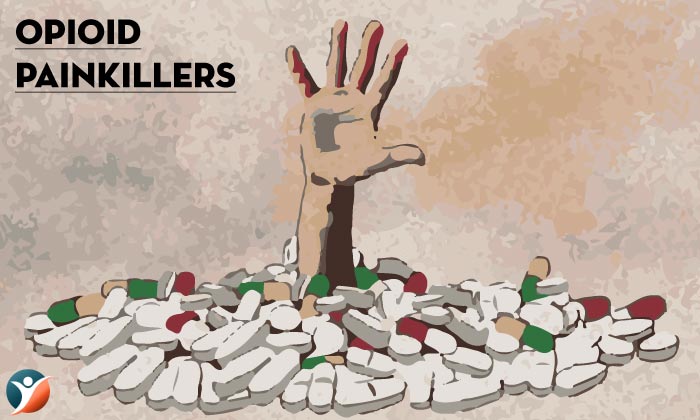
An opioid is pain-killing drugs produced from opium or made synthetically. This class of drugs also includes heroin, codeine, morphine etc.
Recognizing signs of opioid painkillers
Well, identifying addiction to opioids can be a difficult task because a confusion still exists between what should be considered as abuse and addiction. Still, a list of distinctive features has been created to recognize its addiction like,
- Strong desire to obtain and use the drug in spite of negative consequences.
- Not capable of controlling the level of substance use.
- Experiencing withdrawal issues.
Common signs
- Dropped eyes
- Lack of energy
- Neglecting social activities
- Slurred speech
- A decline of performance at work and school
- Itchy skin
- Impulsive actions
Prevention
To overcome addiction to painkillers is almost impossible. So, initially, it is suggested to go for a medical detoxification program. This simple program helps to overcome the withdrawing symptoms and provides a solid foundation for inpatient or outpatient treatment.
We know drug addiction is a very complex problem as it can affect every aspect of your life. And self-test and overcoming addiction is very necessary if you wish to take a charge of your life without being dependable. So, reach out or join rehab or self-help programs because support is necessary.




